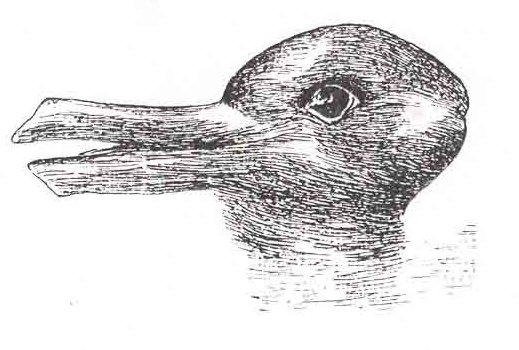 Thomas Kuhn used the duck-rabbit optical illusion, made famous by Wittgenstein, to demonstrate the way in which a paradigm shift could cause one to see the same information in an entirely different way. (Wikipedia)
Thomas Kuhn used the duck-rabbit optical illusion, made famous by Wittgenstein, to demonstrate the way in which a paradigm shift could cause one to see the same information in an entirely different way. (Wikipedia)
Inexplicable lab results may be telling us we’re on the cusp of a new scientific paradigm
April 19, 2018 (Scientific American) -- Every generation tends to believe that its views on the nature of reality are either true or quite close to the truth. We are no exception to this: although we know that the ideas of earlier generations were each time supplanted by those of a later one, we still believe that this time we got it right. Our ancestors were naïve and superstitious, but we are objective -- or so we tell ourselves. We know that matter/energy, outside and independent of mind, is the fundamental stuff of nature, everything else being derived from it -- or do we?
In fact, studies have shown that there is an intimate relationship between the world we perceive and the conceptual categories encoded in the language we speak. We don’t perceive a purely objective world out there, but one subliminally pre-partitioned and pre-interpreted according to culture-bound categories. For instance, “color words in a given language shape human perception of color.” A brain imaging study suggests that language processing areas are directly involved even in the simplest discriminations of basic colors. Moreover, this kind of “categorical perception is a phenomenon that has been reported not only for color, but for other perceptual continua, such as phonemes, musical tones and facial expressions.” In an important sense, we see what our unexamined cultural categories teach us to see, which may help explain why every generation is so confident in their own worldview. Allow me to elaborate.
The conceptual-ladenness of perception isn’t a new insight. Back in 1957, philosopher Owen Barfield wrote:
“I do not perceive any thing with my sense-organs alone.… Thus, I may say, loosely, that I ‘hear a thrush singing.’ But in strict truth all that I ever merely ‘hear’ -- all that I ever hear simply by virtue of having ears -- is sound. When I ‘hear a thrush singing,’ I am hearing … with all sorts of other things like mental habits, memory, imagination, feeling and … will.” (Saving the Appearances)
As argued by philosopher Thomas Kuhn in his book The Structure of Scientific Revolutions, science itself falls prey to this inherent subjectivity of perception. Defining a “paradigm” as an “implicit body of intertwined theoretical and methodological belief,” he wrote:
“something like a paradigm is prerequisite to perception itself. What a man sees depends both upon what he looks at and also upon what his previous visual-conceptual experience has taught him to see. In the absence of such training there can only be, in William James’s phrase, ‘a bloomin’ buzzin’ confusion.’”
(more)
READ MORE: Scientific American











